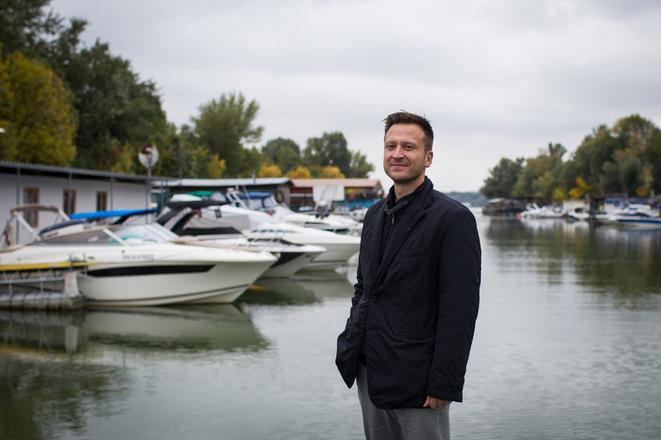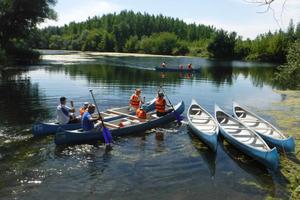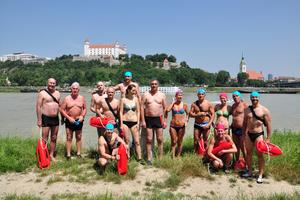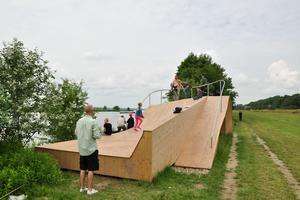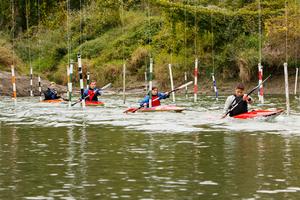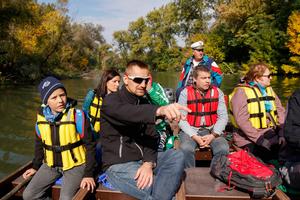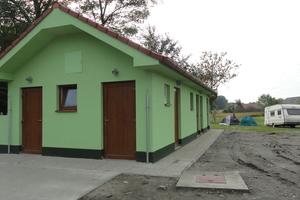JURAJ ČORBA'S enthusiasm for the Danube River and all things water-related is infectious. He believes that Slovakia has a valuable natural patrimony in the form of the river and floodplain forests that lie on the Slovak banks of the Danube, and that much of their potential remains to be harnessed. His personal relationship with the river is one factor behind the Danube Fund (Dunajský fond), which he co-founded two years ago within the Central European Foundation (CEF). The Slovak Spectator spoke with Čorba, who is responsible for programme and strategic partnership development at the CEF, about the importance of the river, why he and his colleagues launched the Danube Fund, and about the fund's goals and plans.
The Slovak Spectator (TSS): Do you have a personal relationship with the Danube?
Juraj Čorba (JČ): Yes. I go for canoeing trips and I even hold a licence to pilot a motorboat, but I have huge respect for it. Anyway, there was something personal on my side when we were launching the Danube Fund two years ago.
We have in the Danube and the adjoining land an incredible asset. My recent trips to other towns and places located on the Danube, for example in Germany or Austria, show that the position Bratislava has on the Danube, and the whole network of river branches we have from Bratislava up to Štúrovo, is really unique. From the viewpoint of life on the planet, floodplain forests along with rainforests and coral reefs are a very precious source of life.
TSS: What does the Danube mean for Bratislava?
JČ: The Danube is one of the most important keys, if not the most important, to the future of the city. The theme of water is already very topical around the world and this is not only because of expected climate change. It is the Danube which will show whether we are able to utilise the excellent position of Bratislava, and in what way we are able to develop cooperation with other nearby foreign metropolises and with other Slovak towns on the river. It is also a kind of test, of whether we ourselves here in Bratislava will be able to cooperate and develop the area in the city in a way that fulfils the potential that the river offers.
TSS: Are you suggesting that Bratislava does not currently utilise its full potential?
JČ: The potential is certainly bigger than how we use the river in the city now. Already a lot of things are happening on and around the river, including not just construction but also transport and generation of electricity. But the question which the Danube Fund opens is that of quality of life. This means whether along with these important activities there is also space for details like whether the ordinary citizen feels satisfied, whether he can move comfortably, whether he has closer contact with the water and whether he can pursue activities there that belong to the river. These do not only pertain to protection of nature, but also to recreation – either fishing or water sports – and many other activities. There already exist many interesting communities on the Danube. We just don't know about them, nor are we grateful for them.
TSS: Why did the Central European Foundation launch the Danube Fund?
JČ: We selected the theme of water in the country because it is an area that has a chance to attract philanthropic interest and activities over the medium to long term horizon. As I already said, we expect that importance of the topic of water in inhabited areas and in the countryside to increase.
TSS: How does the Danube Fund work?
JČ: The Danube Fund is not a defender of any specific opinion. On the contrary, it wants to be a platform for the exchange of opinions and solution finding. We are neither a lobbying organisation nor a grouping of professionals or experts. We are a foundation. We collect financial as well as non-financial funds which we re-distribute amongst various non-profit activities. We announce calls for grants which are open to all non-profit organisations connected with the territory of the Danube in Slovakia, what means from Devín to Štúrovo, including the Small Danube. The topic in which we are interested is the quality of public spaces, public infrastructure and in a wider sense the quality of life on the river, from the viewpoint of people but also nature.
TSS: Whom do you bring together in order to discuss utilisation of the river and adjoining areas, and create projects?
JČ: We have gradually found out that the river is a very complex and complicated territory and that if we want to conduct our supporting activities in a meaningful way and if our activities and those we support are to have a longer-term effect, they have to be based on a fundamental understanding of all stakeholders active on this territory. This means from the highest level of the European Union, which deals with the Danube in its strategic policies, via the state and local municipalities, and public companies that fulfil important tasks like water management, flood control or development of public ports, to private investors who today affect to a large extent how the public space develops, to the whole variety of communities that are bound to the river, like water sportsmen, nature conservationists and anglers.
TSS: This is an exceptional circle of varied stakeholders. To what extent do these people and organisations know about each other, communicate with each other, and even cooperate?
JČ: This interested us too. We have found out that there really is space for meaningful activity, for improvement of communication. This is why we organise the Forum of the Danube Fund each year. At this event, all these stakeholders can present themselves and talk to each other. Its second edition just took place, on the autumnal equinox, September 22.
TSS: Over the summer, the Danube Fund also organised a monthly programme, Solstice on the Danube…
JČ: We came to the conclusion that if we want to demonstrate the values embedded in our charter, we have to somehow communicate with the wider public. So we called on all organisations and communities active on the Danube to open up and show ordinary people what and where they actually do on the river. This is how the programme Solstice on the Danube originated.
It took place for the first time this year and people were able to attend various activities on the river during the whole month of June and the first weekend of July. In total almost 50 subjects joined it.
TSS: Do you have any other activities?
JČ: We want to find out whether there exists some basic agreement amongst stakeholders themselves on what they perceive as opportunities that should be utilised or problems that should be solved. Thus we launched a working group for the wider area of Žitný Island, called RiverLab. So far, the result of its work is a definition of joint priorities. Next year it should agree upon recommendations for those who decide about the river in the public and private sector.
TSS: From where did you take inspiration when launching the Danube Fund? Were you inspired by some examples from abroad?
JČ: The fact that we are arriving with a fresh wind from the position of a private foundation is unique. This reflects the social development in central and eastern Europe, which over recent decades has been quite specific. To say it in other words, when I met with people who are dealing with matters related to the Danube in Germany or Austria, I found out that there exist structures of public character established long before, while these are part of their self-governing or public-business activities.
But here in Slovakia these mechanisms are just being created. This is also why we thought for a relatively long period about how we can be useful from the position of a foundation. This is why we have not taken an activist or expert position. Instead, we are trying to create conditions in order that the best possible joint model of maintenance of public spaces and infrastructure on the Danube in Slovakia can be created, based on mutual understanding and respect. We also wanted to take into consideration the specific conditions here in Slovakia. Thus it is not possible to say that we have found inspiration in any concrete model abroad, but it was the foreign environment which enabled us to understand the importance of the river and water for towns and the countryside. This model of support, which we have created and offered to all here in Slovakia, in the public as well as the private sector, reflects local conditions.
TSS: What are the goals of the Danube Fund?
JČ: Our aims are incorporated in our charter, which is open for any interested party to sign. We focus on quality of life in relation to publicly accessible spaces and public infrastructure. But we do not perceive quality of life only from the viewpoint of people, but also nature. These questions include access to water, contact with the river either physical or visual, natural and enjoyable movement either on or along the river or from one bank to another one. Further, these are questions of protection of the value we have here, cooperation with neighbours either within Slovakia but also with Austria and Hungary. It is also a question of a balance of activities that are extremely variable on the river – from industrial activities to recreation. For the potential of the river to be utilised there must exist mutual balance and coordination.
TSS: The Danube Fund develops its activities along the whole flow of the Danube in Slovakia. Where it does work the best?
JČ: We are very well perceived in those cities where the situation is less complicated because there is a lower number of stakeholders. These are, for example, the towns of Komárno and Štúrovo. For example, Štúrovo has built a promenade along the Danube in the past what is very inspiring for other towns on the Danube. Of course, the motivation in Štúrovo was specific because they have from their bank a spectacular view of Esztergom in Hungary. Neither Bratislava nor Komárno have such a panorama. But the Solstice programme has shown that we have managed to mobilise the whole area from Bratislava to Štúrovo, including the Small Danube.
TSS: How do you perceive efforts to declare the Podunajsko National Park along the Danube and floodplain forests?
JČ: The topic of this national park is exactly the theme that shows how things on the river are closely related, why it is important to view this territory from a comprehensive standpoint, why it is important to communicate with all stakeholders, and why a substantial change can happen only when it is based on mutual agreement and understanding. But I believe that there is a general accord that what is important is that the protection of this territory is not only on paper but that any protection regime stands on real respect and the basic agreement of all stakeholders.
TSS: Last year you announced a call for grants for the first time. Did the applicants meet the idea of the Danube Fund in terms of the projects it wants to support?
JČ: Yes. Within the first call we distributed almost €27,000 and the interest it raised shows that the territory along the Danube is really alive and that non-profit organisations belong amongst its important stakeholders. We received 26 applications, of which we selected six to support. These represent a wide range of diversified activities from sports via development of tourism infrastructure, to technological virtual experiments, up to commemorating victims of the Holocaust.
We are glad that the money we will distribute within the second call is almost double, €45,000.
TSS: Have some projects already applied?
JČ: No, it is too early. As in the first call, the second is set in order to motivate those interested in cooperating. This means that we would like to see that projects have the support of related local municipalities or private enterprises. But this requires time. This is why we have postponed the deadline compared to last year, to December 15.
TSS: Among donors to the Danube Fund is the Kúšiks family. Such a private initiative is rather exceptional in Slovakia…
JČ: Philanthropy among individuals is only developing in Slovakia. In terms of the Kúšiks family, they have a strong local-patriotic relationship with the Small Danube. Also, by their support for the second call for grants, to which they have contributed €10,000, they are linking up with activities they have already developed on the territory of the Small Danube.
TSS: Was it the Kúšiks family which approached the Danube Fund?
JČ: I read in local newspapers that this family had renewed the river promenade in the Bratislava borough of Vrakuňa. So I approached them to ask whether they would also like to support something via the Danube Fund. We are glad that they accepted this offer.
TSS: Who else contributes to the Danube Fund?
JČ: We are glad that our initiative is being supported by donors. In the first as well as the second call these included the VÚB Foundation and Slovnaft, a.s.. Equally, we esteem any other support for the Danube Fund. Everybody can help somehow, either with money or knowledge or experience. This is the model we use. Actually, also the Solstice on the Danube programme originated like this – it was a voluntary activity of almost 50 entities which organised events at their own expense, for which we – with the support 21 partners - provided a unifying umbrella.
TSS: What plans does the Danube Fund have for the future?
JČ: I firmly believe that we will organise another edition of the Solstice festival. We would also like to extend the Solstice towards Vienna and the Hungarian side. Our goal is to make it an international festival initiated by Bratislava.
In terms of the work group RiverLab Žitný Ostrov, in which stakeholders are looking for solutions to concrete problems in this area, next year we would like to work up recommendations for those who make decisions about this area in the public and private sectors. The possibility of creating such such a working group for Bratislava remains open.
We would also like to match donors with bigger non-profit projects, because given the volume of money we redistribute now, we are able so far to direct our grants towards smaller projects only.
And of course the most important aim is to keep communication within the network that has been created here, and mutual understanding. But it is the reactions of people which give us reason for some optimism. It seems to us that people understand what our goals are and that they also understand that it also depends on them to what extent we will succeed.


